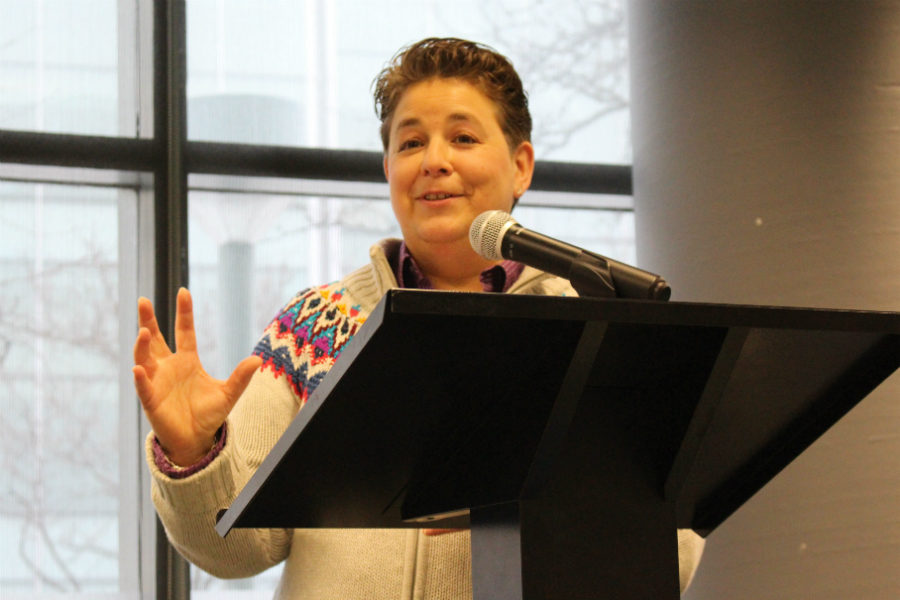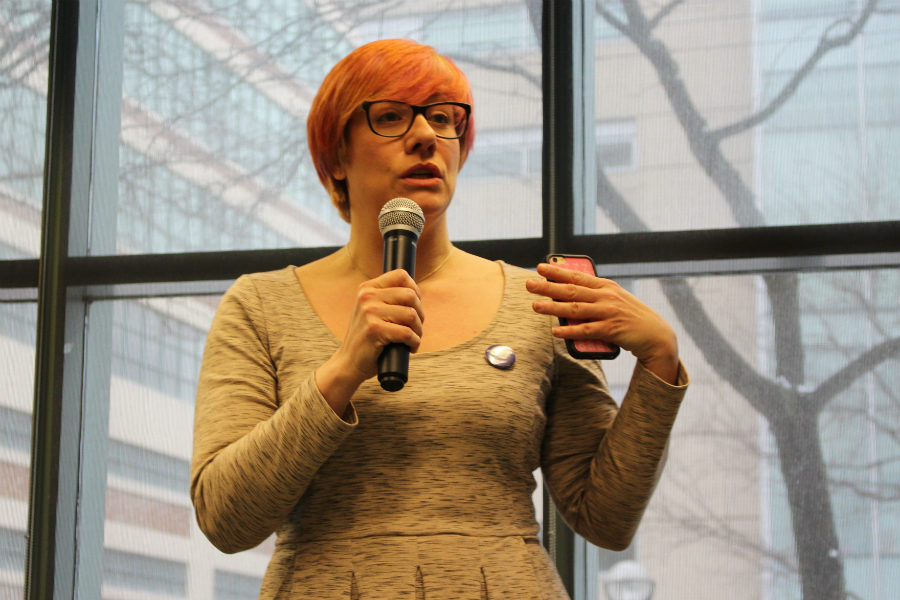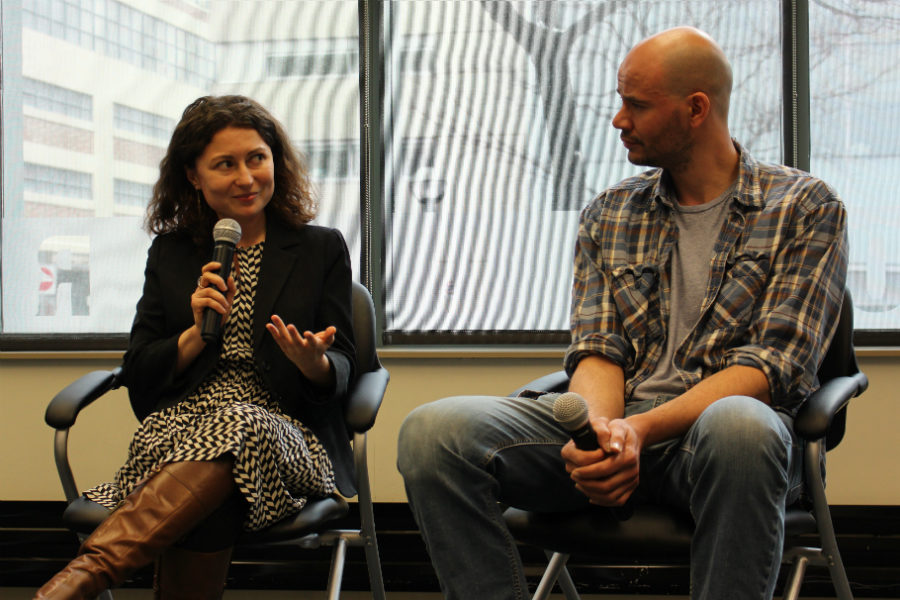By JASMINE BALA
Staff Reporter

Journalism matters now more than ever, the media director of the Canadian Civil Liberties Association told journalism students and faculty during the Ryerson School of Journalism’s (RSJ) recent teach-in day.
Gail Cohen, former editor of the Law Times, said that while the news industry is struggling to adjust to digital and business challenges, the fundamental role of journalists in a democracy has not changed.
“[Journalism] changes the law and it uncovers tremendous harm,” Cohen told the crowd. “It rights wrongs by shining light on unjust and harmful behaviour by individuals, corporations and most importantly, by the government.
“These are definitely troubled times and the role of journalists – however you define that – is still tremendously important, particularly [in] protecting our democracy and fundamental freedoms.”
The RSJ cancelled classes on March 14 and instead hosted a daylong program of workshops and panels designed to help students make sense of the current news environment. These sessions were designed to equip students with the skills and knowledge to manage at a time when “journalists – and so many others – are being insulted, demeaned and dismissed,” reads the teach-in’s website.
Following Cohen’s address, working journalists delivered a series of 10-minute power pep talks. Toronto Star columnist and digital editor
Shree Paradkar said she gets a relentless stream of comments from trolls who attack her personally. “I actually don’t care about it,” she said. “I have the conviction that what I’m doing or what I’m saying is right. So when people resort to attacks that are just personal and have nothing to do with the topic on hand, then I think that’s an unravelling on their part.”
Paradkar said when her column on race and gender launched she “only expected negativity.” She therefore celebrates any positive comments that come to her and engages senders in conversation.
“It’s only when people actually come with a point and counterargument that I’m able to have a discussion,” she said.
During her power pep talk, Torontoist interim managing editor Andrea Houston said that although the line between advocacy and regular reporting is increasingly blurred, accuracy is still what defines quality journalism: “Having an opinion and having a bias doesn’t make you a bad journalist,” she said. “We’re at a place now in this new world that we’re in – reporting in an age of Trump – where [advocacy] can’t be a bad word. It has to be your motivation. It has to feed that fire in your belly.”

Houston, who teaches a course on queer media at the RSJ, said journalists have to go back to the basics and be “frontline watchdogs.” This means challenging authority and “calling out injustice, calling out oppression and not being afraid to put your cards on the table,” she said. “We’re meant to be that person in between power and the public to filter information, but also to amplify voices … that don’t normally get amplified.”
The need for journalists to give voice to the voiceless was also a theme during the event’s workshop: “Refugee, Immigrant, Permanent Resident, Citizen: Why you need to know the difference.” Graham Hudson, an associate professor in Ryerson’s criminology department, said journalists have a responsibility to make sure the voices of non-status migrants are heard and to ensure the public understands what the migration experience really looks like.
A non-status migrant, Hudson said, is a person who has entered and remained in Canada without explicit authorization from the federal government. Terms that are synonymous with this, he adds, are “irregular migrant,” “undocumented migrant” and “migrant with precarious status.”
Using the term “illegal migrant,” on the other hand, “distorts the discourse,” Hudson said, noting that it has been used incorrectly to describe refugees crossing the U.S. border into Manitoba and Quebec.
In fact, he said, asylum seekers have a “legal right to enter a country without legal permission. It sounds weird, but that’s how the statute of Immigration and Refugee Protection Act was phrased and that’s how international law is phrased and it makes a lot of sense.
“If you’re a refugee and you’re fleeing from persecution or grave human rights abuses, you don’t have the luxury of time to wait, to apply for a visa to enter the country – you’re fleeing for your life and time is of the essence.”
Terms such as “illegal migrants” are used to frame debates and shift discussion – and media coverage – away from “what’s going on in the real world of migration,” Hudson said.
A recent study he worked on with fellow researchers Charity-Ann Hannan, Michele Manocchi and Idil Atak, for instance, concludes that Toronto is not living up to its promises of being a “sanctuary city.”
“The policy,” Hudson and his co-authors write, “directs city officials not to: 1) inquire into immigration status when providing select services, 2) deny non-status residents access to services to which they are entitled and 3) share personal or identifying information with federal authorities, unless required to do so by federal or provincial law.”
The policies are designed to ensure the children of non-status migrants go to school and that they and their families have access to healthcare and police protection. Contrary to the policy, however, the report notes that police officers do ask about immigration status and have “engaged in unsolicited sharing of personal information with the Canadian Border Services Agency (CBSA) and arrested and transferred non-status persons to the CBSA.”

RSJ graduate Melita Kuburas, who was also part of the immigration workshop, said she and her family came to Toronto as refugees in 1993 and that a Toronto Star article about her family’s arrival influenced her career choice.
Kuburas, who is now the associate managing editor of Metro News’ entertainment and lifestyle section, said her parents kept a clipping of the story and photo in a drawer. “I always looked at the [photo] and I think – I’m sure – that symbolically, that made me want to go into journalism,” she said.
Kuburas and her family were Bosnian Muslims caught up in the civil war and conflict after the breakup of socialist Yugoslavia.
“One day, we just saw tanks coming through our little town and Serb military soldiers knocked on everyone’s doors,” she told the rapt audience. The soldiers ordered teenage boys and all grown men, including her father, to go with them, Kuburas said, but one of her youngest uncles – who was only 18 at the time – fled and hid.
“When Serbs found out that he was hiding, they came to collect him and he was killed,” she said. “We have never found his body.”
The body of her grandfather, she said, was found in a mass grave along with 200 or 300 others.
Her father was shipped to a concentration camp, where he was “starved, beaten, kept from his family for nothing more than being Muslim,” Kuburas wrote in an article about her own refugee experience following the announcement in 2015 of Canada’s plan to take in 25,000 Syrian refugees.
Kuburas said the family was reunited with her father in December 1992 with help from the Red Cross, and a year later they came to Canada as government-sponsored refugees.
“Welcoming refugees is very generous of Canada, and of Canadians,” Kuburas wrote in her article, “but I can assure you: refugees are not freeloading.”
Watch one of the RSJ’s teach-in sessions, “Surveillance: Borders and Beyond,” below:
